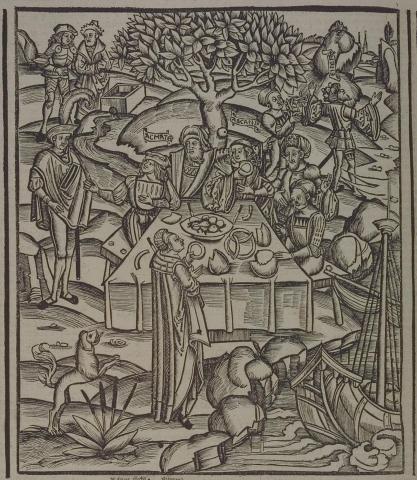CORE VOCABULARY
effor, fātus sum, 1, dep. a. and n.: to speak forth; speak, say, 6.560. (ex and for)
frondeō, 2, n.: to be leafy; to bear or put forth leaves; frondēns, leafy, 3.25; green; still bearing leaves, 4.399. (1. frōns)
tempus, oris, n.: 1. Time in general, a period, time, 1.278; interval or space of time, 4.433; crisis, circumstance, juncture, 7.37; season, fitting time, opportunity, proper moment, 4.294; ex longō (tempore), in or for a long time, 9.64. 2. The temple of the forehead, 9.418; commonly pl., 2.684; of animals, 12.173.
rāmus, ī, m.: a branch, bough, 4.485, et al.; limb, 8.318; wreath, 5.71.
implicō, āvī or uī, ātus or itus, 1, a.,: to fold in; involve, entangle, entwine, 2.215; to wheel, 12.743; (w. dat.), bind to, 11.555; infuse, 1.660; insinuate, mingle, 7.355; sē implicāre, cling to, 2.724.
genius, iī, m.: the birth-spirit; a tutelar deity, or guardian genius, 5.95. (genō, gignō)
tellūs, ūris, f.: the earth, 6.140; ground, soil, earth, 1.358; land, 1.171; a land (of an island), 1.34; a country, territory, state, kingdom, 11.245; personified, Tellūs, the goddess Tellus or Earth, 4.166.
nympha, ae, f.: a bride, a maiden; a nymph, one of the inferior deities, presiding over fountains, woods, etc., 1.71, et al.
ignōtus, a, um: (adj.), unknown, 1.359; strange, 5.795; not well known, but little known, 11.527.
nox, noctis, f.: night, freq.; darkness, 1.89; dark cloud, black storm-cloud, 3.198; sleep, 4.530; death, 12.310; personif., Nox, Night, the goddess of night, 3.512.
Īdaeus, a, um: (adj.), of Mount Ida (either in Crete or in the Troad), Idaean, 3.105; 2.696, et al.; pertaining to Cybele, goddess of the Trojan Ida, 9.112.
Iuppiter, Iovis, m.: Jupiter, son of Saturn and Rhea, and king of the gods, 1.223; Iuppiter Stygius, Pluto, 4.638.
Phrygius, a, um: Phrygian, Trojan, 1.381; subst., Phrygiae, ārum, f., Phrygian or Trojan women, 518. (Phryx)
invocō, āvī, ātus, 1, a.: to call upon; invoke, adore, 7.140.
duplex, icis: adj. (duo and plicō), twofold, double, 1.655; lying over each other, lapping, 9.707; both, 1.93; twin, 12.198.
Erebus, ī, m.: the god of darkness, son of Chaos and brother of Night, 6.247; darkness; the lower world, 4.26, et al.
omnipotēns, entis: adj. (omnis and potēns), all-powerful, almighty, 1.60; supreme, sovereign, 10.1; subst., The Almighty, 4.220.
ter: (num. adv.), thrice, three times, 1.94, et al. (trēs)
intonō, uī, ātus 1, n. and a.: to thunder, 1.90; (impers.), intonat, it thunders, 2.693.
radius, iī, m.: a staff, rod; spoke of a wheel, 6.616; beam, ray, 5.65; a shuttle, 9.476; the representation of rays on a crown, 12.163.
ārdēns, entis: burning, hot, sparkling, flaming, 5.637; bright, 4.482; impassioned, ardent, eager, 1.423; spirited, fiery, 1.472; glowing, lofty, 6.130; fierce, furious, 2.529; angry, 6.467. (ardeo)
manus, ūs, f.: the hand, 1.487; freq.; (meton.), action, movement of the hand; work, art, handiwork, 3.486; prowess, heroic deed, action, 2.434; force, violence, 2.645; a collection of persons; a band, crew, troop; an army, 2.29; forces, 5.623; multitude, 6.660; pl., manūs, workmen, 11.329; dare manūs, to yield, 11.558; extrēma manus, the finishing hand or touch, 7.572.
quatiō, no perf., quassus, 3, a.: to shake, freq.; brandish, 11.767; flap, 3.226; shatter, 2.611; make tremble, 5.200; thrill, penetrate, 3.30; ransack, beat up, search, scour, 11.513; torment, 6.571; assault, 9.608; spur, 12.338.
nūbēs, is, f.: a cloud, 1.516, et al.; storm, 10.809; the air, 12.856; (fig.), flock, multitude, 7.705.
dīdō, dīdidī, dīditus, 3, a.: to spread abroad, disseminate, 7.144.
Trōiānus, a, um: adj. (Trōia), Trojan, 1.19; subst., Trōiānus, ī, m., a Trojan, 1.286; pl., Trōiānī, ōrum, m., the Trojans, 5.688.
rūmor, ōris, m.: report, rumor, 4.203; a cheer, shout, 8.90.
certātim: (adv.), with striving or contention; emulously, vying one with another; with every blow, 2.628; emulously, 3.290; impatiently, 11.486; as if in rivalry; fiercely, 11.209. (certō)
īnstaurō, āvī, ātus, 1, a.: to build; perform, celebrate, 3.62; revive, resolve anew, 2.451; celebrate anew, 4.63; renew, 2.669; repay, requite, 6.530.
epulae, ārum, f.: a banquet, feast, 1.79; food, 1.216. (sing. epulum)
ōmen, inis, n.: a prognostic, token, sign, omen, 2.182; (meton.), evil, 2.190; auspicious beginning, 7.174; pl., auspices; rites, 1.346; in ōmen, as or for a warning, 12.854.
crātēr, ēris, m., acc. sing. ēra, pl. ēras: a large mixing bowl or urn; mixer; bowl, 1.724; jar, 6.225.
corōnō, āvī, ātus, 1, a.: to encircle with a crown or garland; crown, wreathe, 4.506; encompass, surround, 9.380. (corōna)

